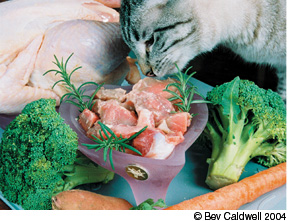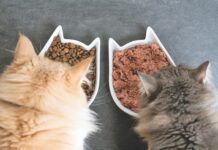You think to yourself: Whats with this cat? For the second time this week, Ms. Spots has barely touched her food. You begin to wonder if shes sick – or just sick of her normal table fare.

288
Healthy cats will occasionally eat less food or skip a meal, but it is not normal for a cat to consistently refuse food, according to experts.
Cats are generally pretty content eating the same food over and over again, says Jim Richards, DVM, director of Cornells Feline Health Center and editor of CatWatch. If your cat refuses to eat for several meals running, it should be a cause for concern. The signs of illness in cats can be subtle, says Dr. Richards. A loss of appetite can indicate several types of health problems.
There are benign reasons why your cat may skip a meal or eat less food. If you switch your brand of cat food, your cat may simply not like it as much or may experience indigestion from the sudden dietary change. If the new food has a greater caloric density than the old food, the cat will decrease his caloric intake accordingly. If you plan to use a different cat food, make a gradual dietary transition over a weeks time. Begin the transition by mixing a small amount of the new food into the usual food. Each day, increase the concentration of new food until – after about a week – it constitutes the entire meal.
A cats food intake may also change according to his activity level. Also, if you have an outdoor cat, keep in mind that he may be visiting a neighbors house to snack on the food they leave out for their own cats.
Cyclical Pattern?
Sometimes cats exhibit cyclical food patterns, according to Katherine Houpt, VMD, PhD, director of Cornells Behavior Clinic. Research has revealed that when cats have food available ad libitum (otherwise known as free choice to you and me), their eating patterns can fall into a cycle lasting from several weeks to two months. During this cycle, a cats appetite will become suppressed periodically. At the low point of this appetite cycle the cat will eat less, allowing its body weight to fall. After a short time – lasting from a few days to a couple of weeks – the cat will resume its normal caloric intake.
Both Drs. Houpt and Richards emphasize that an occasional change in the amount your cat eats or an occasional skipped meal is not normally cause for concern.
The Exception
What about the cat with the clean bill of health who waits while the owner opens can after can, finally accepting one as a palatable one? Although there are no formal studies on this behavior, the IAMS Company reports that a significant number of the 250,000 to 300,000 telephone inquiries they receive per year is on this topic alone.
Many veterinarians believe that if a cat is hungry enough, he will eat anything. But cat owners agonizing in the cat food aisles of supermarkets, rejecting one flavor after another, support the view that cats are finicky eaters. Experts suggest that when switching food, you should try to remain within the same formula and focus on a different flavor. Become familiar with your cats habits so that you will notice anything that is inconsistent or unusual. If your cat stops eating for more than a day or so, consult your veterinarian promptly.



